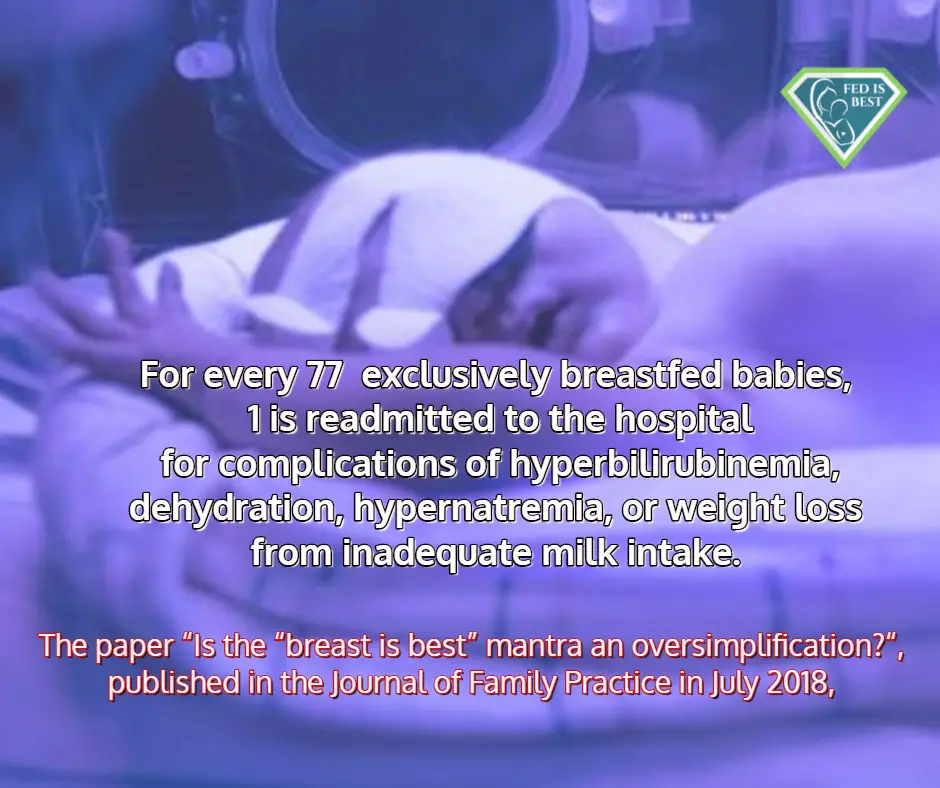In most hospitals and prenatal educational materials, exclusive breastfeeding (EBF) is the recommendation for infant feeding. EBF is promoted as the only healthy way to feed a baby, with partial breastfeeding, temporary supplementation, and formula feeding falsely characterized as “suboptimal.” Other infant feeding options, such as exclusive pumping or formula supplementation, are discouraged, even when requested by parents. But does this narrow definition of healthy infant feeding support patient rights and ethical infant feeding principles? No, it does not.
Infant feeding support in postpartum units should consider ethical principles of autonomy, beneficence, justice, and non-maleficence when considering the extent to which lactation should be promoted.
What Are The Principles of Ethical Infant Feeding?
Autonomy: The parents choose how they intend to feed their baby at each feeding, and maternal bodily autonomy is affirmed and respected.
Beneficence: The benefits of infant feeding types are provided to the parent to help them make an informed decision. Healthcare providers must not decide what is best for the parent.
Justice: Do not assume a feeding method. Ask the parent how they want to feed their baby. Affirmative consent must be obtained before touching a patient’s body.
Non-maleficence: Avoids harm to the parent and/or babies, such as insufficient colostrum/milk intake while EBF. Research shows that 1 in 77 EBF babies are hospitalized from complications of insufficient feeding, and EBF is the most common risk factor for hyperbilirubinemia (excessive jaundice that can impair brain development). Sleep deprivation for parents causes newborn falls and accidental suffocation. Infant feeding should always be discussed using nonjudgmental language and unconditional positive regard to avoid instilling or exacerbating psychological distress. Mental health disorders affect 1 in 5 parents during pregnancy, and the first year after birth, making them particularly vulnerable.

What Do Parents Want?
In the United States, parents have limited or no paid time off from work after childbirth, often directly impacting how they feed their babies. They depend on their employers for job security and medical insurance to provide housing, food, clothing, transportation, and daycare expenses. Not every parent can physically lactate or provide 100% human milk to their baby, and not every parent chooses to breastfeed or chestfeed. The parent’s mental or physical health must be prioritized over promoting exclusive breastfeeding.
Parents have told us they need individualized and unbiased infant feeding support that prioritizes their own and their baby’s safety, honors their bodily autonomy, prioritizes optimal parental mental health, and supports how they wish to divide infant feeding responsibilities with their partners. They want to receive support that leaves them confident with their chosen infant feeding method.
We believe that they deserve no less.
The Ten Steps To Ethical, Successful, And Inclusive Infant Feeding
- Implement an inclusive infant feeding policy that is routinely communicated to staff and parents, prioritizes infant safety, parental rest, and recovery, and protects parental mental health. Monitor and publicly disclose the hospital or institution’s infant feeding complications and readmission rates.
- Ensure that all medical staff has up-to-date knowledge, competence, and skills to support breastfeeding, formula feeding, pumping, supplementing, and combination feeding.
- Discuss all feeding options with expectant parents without judgment or bias at every interaction. Provide education about the differences between all feeding options, so parents can be fully informed to choose the feeding method that works best for their family.
- Facilitate immediate and uninterrupted skin-to-skin contact, if desired. Support parents to initiate feeding within the first hour of life or as soon as parent and baby are medically stable.
- Teach parents how to initiate breastfeeding and how to maximize their milk supply, and manage common breastfeeding or chestfeeding difficulties. Educate them on how to supplement, pump, and combination feed as needed or desired by parents. Teach them how to prepare infant formula safely and bottle-feed their baby responsively.
- Ensure affirmative consent before touching the parent’s breasts, nipples, or body with every encounter.
- Enable parents and their infants to remain together 24 hours a day if desired; provide A well-baby nursery for those who want to use it for rest, recovery, or any other reason requested by the parents.
- Support parents in recognizing and responding to their infant’s hunger and fullness cues. Educate parents on the importance of feeding a baby until they are satisfied after every feeding.
- Provide information to parents about feeding devices such as bottles, nipples, pacifiers, and breast pumps. Educate parents about the types of formula available and how to prepare infant formula safely.
- Coordinate discharge by providing parents with community feeding support groups and resources that support their feeding method. A follow-up pediatrician appointment should be made at discharge for ongoing feeding support.
Hospitals must have policies to support ethical infant feeding.
Resources:
Breastfeeding Support Guided by Swanson’s Theory of Caring – PubMed (nih.gov)
Autonomy for Mothers? Relational Theory and Parenting Apart by Susan B. Boyd :: SSRN
Could the Baby-Friendly Hospital Initiative be hurting mothers—and babies too? (advisory.com)
Do ‘Baby-Friendly’ Hospitals Work for All Moms? – The New York Times (nytimes.com)
A Lack of Evidence for Baby-Friendly Hospitals (undark.org)
Nurses Are Speaking Out About The Dangers Of The Baby-Friendly Health Initiative – Fed Is Best
Our mission statement is:
The Fed Is Best Foundation works to identify critical gaps in the current breastfeeding protocols, guidelines, and education programs and provides families and health professionals with the most up-to-date scientific research, education, and resources to practice safe infant feeding with human milk, formula, or a combination of both.
Above all, we strive to eliminate infant feeding shaming and preventable hospitalizations for insufficient feeding complications while prioritizing perinatal mental health.
